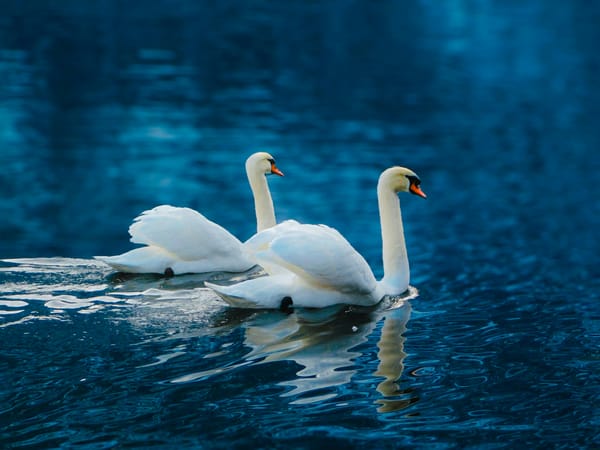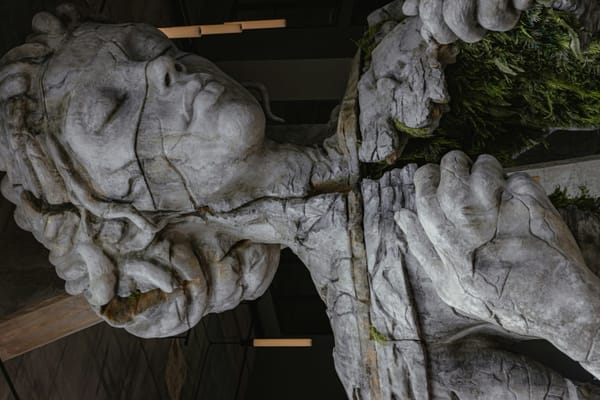The Clay Woman
A Short Story

Once upon a time, in a land far, far away, there lived a little girl named Cora.
Each day, she sat, digging her heels into the soft Earth, in the mudflats where the river meets the Great Sea. Each day, she would lean forward, knees bent, and pinch pieces of clay from the ground where it had congealed.
She’d yank a chunk only to swing her shoulder back and sling it into the waters that lay ahead. She’d pluck lump after lump, roll each into a ball, only to fling them all back into the waters from where the mud once came.
Each day, she played and shaped the clay, but each day, she hurled it back into the estuary. Every day, for months, if not years… her creations sank back into the land of deep sleep.
But on this particular day, for reasons unknown, the air stirred… differently.
An old woman trotted along the path from the sand to the mudflats. She had decided to venture beyond her usual stroll by the shore when she noticed something rather curious far off. A little girl, all alone. “In this heat?”, she thought.
She trudged along, putting more weight into her feet than her cane as the ground grew soft. When she stepped into the muck she grasped her skirts so they wouldn’t be marred, but winced at the throbbing in her swollen hands.
Soon, Cora heard the squelching of mud behind her, and immediately spun around.
The old woman smiled and paused, shifting her weight onto the cane once again, before she pried, “What are you making?”
Cora hid the clay in her hands and turned to face the water. “Nothing.”
The old woman sensed her intrusion unwelcome, but could not refrain from interfering once more. “If you like, you could come by my house,” she proposed, “I have proper potter’s clay, and I could teach you.”
The woman waited until Cora looked back at her to point towards the pebbled path.
Beyond the strip of sand, where the waves hit the shore, a modest cottage faced the ocean. Cora had seen the house before and wondered what it was, but never roamed further than the mudflats. Despite her curiosity, Cora remained… silent.
The old woman waited for the little girl to respond, but Cora simply lowered her gaze and began to pick at her wrinkled fingers.
After a minute or two, the old woman grew fatigued. She murmured, “Well, I’ll be there,” and surrendered, shuffling with heavy feet down the path back to her house.
Cora wished she had said something.
But she hadn’t spoken to anyone since she arrived in this strange land.
How much time had passed? She didn’t know where she was, when she was, and especially, why she was… She only knew that she was alone. And had been afraid all the days of her life.
Although the old woman had left, Cora couldn’t stop thinking about the cottage… She imagined forging great animals, and entire worlds, out of clay.
The girl usually returned to her tent by the river in the afternoon, but today, she threw the last bit of clay into the sea, sprang up, and began to run with mud-stained hands and feet through heaps of sand; she passed the big rock formations, raced down the stone path, through shrubs of lavender in full bloom, until she came to the cottage completely out of breath.
When her heart calmed, she climbed up three porch steps and tugged open the white door.
Cora was greeted by four wooden tables cluttered with tools in the centre of the room, but her attention was quickly diverted to the two women in the back.
Hunched over the furthest table, they worked diligently on a towering clay sculpture of a naked woman. Standing on either side, the students shaped the figure's pregnant belly with tools.
Until they were startled by Cora’s abrupt entrance, that is.
When their gazes pierced through her, she ran. She ran out the door, down the cobbled path, to the water where the ocean hit the shore. She plopped down into the sand, held her head in her hands, and wept.
Mere minutes later, a swishing of sand by footsteps began to eclipse the voices of the waves. It was the old woman, once again.
Despite creaking joints, despite her huffing and puffing, she managed to settle herself down next to the little girl. For a moment, she did not speak but scooped up some sand into her palms, squeezed it, and let it scatter back to the ground.
Then, the old woman turned to Cora and whispered, “Can I ask you something?”
Cora wiped her cheeks and kept the remaining tears in. “Yes?” she hesitated.
“Why were you throwing mud into the water just now?” The old woman was curious what all this turmoil was about.
Tears welled up inside Cora’s eyes once again, and her throat tightened before she could squeak out, “Because... I’m not ready.”
The old woman looked surprised. “Not ready for what?” she probed, with a hint of anger in her voice.
“For anything… To make anything,” cried Cora.
To that, the old woman let out a knowing smile. “Oh, child, nobody is ever ready! They simply feel an impulse bubble up inside and let it be born! You must follow the instinct to go forward, no matter what.”
Cora peered at the old woman, her look of innocence mingled with a desperate desolation. “But what if I can’t live up to the task?”
“You are still young,” the old crone reflected, “Soon enough, you will learn that it is better to fall short than to never give life to what already grows inside.”
Cora sat silently, letting the words wash over her just like the sun’s rays glistened over murmuring waters.
“Alright, that’s enough of a lesson for today,” the woman remarked, and began to get up, burrowing her cane into the sand for support. Cora bounced up to help.
“Let's continue this tomorrow morning. You will come, won’t you?” The woman chuckled. Although she was old, and struggling to walk, and donned a face plastered with wrinkles, Cora noticed the crone had a certain youthfulness about her.
Later, the girl sat by the water all afternoon, watching the sun dip further into the water’s embrace.
As she thought about what the old woman had said, her frustration grew. What was she talking about? What was this thing that grew inside her? What does it mean to give life to that?
She knew it would bother her all night, so she leaped up, washed away the dirt of the day in the sea, and marched down the familiar, yet wobbly, cobblestone path. The cottage beamed like a lighthouse in the darkening night, so she assumed the old woman was still there.
When Cora eased the door open, she eyed a figure asleep on the bed nestled by the windowsill. She tiptoed towards the bed and whispered “Madam?”, afraid to awaken her abruptly.
The old woman did not wake. Cora stuck her finger out and poked her in the arm. When the crone did not move, Cora repetitively jabbed her side. Nothing. Cora’s hands began trembling. She gripped the old woman’s arm and began to shake her.
Still, nothing.
The crone did not budge. She was dead.
Cora darted to the patio and shrieked for help, only to be met with silence. The students had all gone home. The town was miles away; she was alone.
She collapsed on the patio, crying. Who would teach her now? She had nobody, again. Why didn’t she come by earlier? Why didn’t she stay?
Tears poured from her eyes, as if drawn out by bucket and rope from the well where years and years of pain dwelled.
When she opened her eyes to rub them, one golden tear slid down her face and splattered on her legs. Ouch, that stung.
Then, another. Splat, on her arms.
Every tear that came was made of molten gold. And every tear burned like a searing dagger when it hit her body.
But the pain did not come from the scorching of skin; in fact, her skin remained intact. Instead, she was overcome by an internal pulling – the stretching of every organ, the elongating of muscle and bone, the lengthening of flesh, the coalescence of fat around her chest – as her whole body, along with her childish clothes, matured rapidly into a maiden form.
Cora traced her arms with fingertips, then her legs, and stood astonished at her reflection in the cottage window. A stranger, now, within her body too.
Although rattled, she could not tear her mind away from the old woman. So, she wiped the mess of tears away, and returned inside.
Cora examined the dead woman again, but this time noticed a book in her arms, and pried it from her heart. A textured moon hovered over the sea’s horizon on the navy cover. “Back Into The Water,” it read.
She inhaled sharply. Of course.
That's what she had to do – to go, and retrieve what had been lost. Cora tossed the book to the ground and scurried to the ocean, now illuminated only by moonlight.
This time, there was no hesitancy. She stripped off her clothes and hardened her will as liquid ice slammed first against her feet, then her thighs, her midriff, until…
She took a breath, beneath the water.
Although the sun had long since set, a light illuminated Cora’s way.
It came from the depths of the ocean and she followed it past jellyfish and schools of smaller fish, past corals and tunnels of seaweeds; the light eventually led her to the colossal oyster at the bottom of the Great Sea.
Cora approached the oyster with an outstretched hand, but withdrew at once when she felt, in her fingers, a slicing pain. Cringing, she clenched them to stop the bleeding. But the blood dissipated into the water nonetheless, flowing towards the shell and colouring it red.
Then, the oyster shell, like a treasure chest, creaked open. Inside were all the pieces of clay Cora had thrown, shining as pearls.
She approached the shell but upon first contact, jerked her hand away lest it cut her again. This time, she was unharmed, and the luminance of the pearls only grew more ethereal. So, Cora nabbed one and held it in her hands.
The pearl was charged with energy, vibrating, pulling magnetically towards her body. It grew heavier so she shifted to hold it closer to the skin between her belly and heart. Then, by God, the pearl did the most curious thing! It fused itself with her body and… seeped through her skin!
Hungrily, she reached out for another. Again, her body consumed it. Each pearl she absorbed until the oyster was emptied, and the light that had once led her to the bottom of the ocean now shone a bright turquoise from her torso.
Lit from within, she swam up to the shore as the sun now rose.
A crowd of villagers was gathered at the beach. Hushed whispers spread like wildfire in the morning breeze – rustlings of mythical creatures sent to the Earth by the Gods of the Great Sea.
Cora emerged naked, but rushed to clothe herself. The villagers, however, did not recognize her; she had gone from child to woman, overnight.
When Cora approached the group, one man spoke. He marvelled about the light that had drawn all the village-folk out of their dreams, “It was so bright that it lit the whole sky in the dead of night.”
Then, he cast a quizzical glance at Cora's torso which was still radiating a faint blue light, though it had dimmed with the rising of the sun and the addition of clothing.
Cora smiled, but when she remembered the old woman the colour drained from her cheeks.
“Did anyone find the old woman?” she fretted.
When the villagers exchanged puzzled stares, she gathered they had no clue what had transpired. “The old woman, the old woman who was supposed to teach me to make figures of clay, has died. Come, and see,” she beckoned.
Cora led the villagers down the stone path, a trail she felt she'd walked ages ago for the very first time. The once-familiar white door, which she had passed countless times, now appeared ancient, yet strangely new.
She took a deep breath to brace herself for the face of death but was stunned, when she crossed the threshold, by what lay on the other side.
The place had been emptied. No deceased woman lay still by the windowsill.
The lavender had been stripped from the windows, and the tables cleared of work tools. Stacks of books, all gone. Only one thing was left behind – at the centre of each wooden table lay a hefty clump of unformed clay.
Cora cast a bewildered gaze towards the villagers, fishing for answers.
“I see no dead old woman,” one villager proclaimed.
Another, pointing towards the unshaped clay, appealed, “Could you teach us? Our porridge bowls shattered just yesterday evening.”
Cora shook her head and denied, “It’s not my studio… I’m not sure where she went.”
Another villager, this time an older woman, discerned, “It looks like the job’s open, miss,” and after pointing to Cora’s radiating belly, declared, “And you’ve been chosen to fill it.”
Cora placed both palms on her stomach and paused…
She wandered over to one of the tables, plucked a wad from the giant slab, and began to craft... a woman out of clay.




